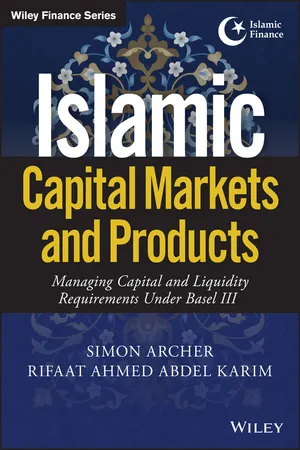
Islamic Capital Markets and Products
Managing Capital and Liquidity Requirements Under Basel III
- English
- ePUB (mobile friendly)
- Available on iOS & Android
Islamic Capital Markets and Products
Managing Capital and Liquidity Requirements Under Basel III
About this book
Ensure Basel III compliance with expert analysis specific to Islamic Finance
Islamic Capital Markets and Products provides a thorough examination of Islamic capital markets (ICM), with particular attention to the products that they offer and the legal and regulatory infrastructure within which they operate. Since Islamic banks act as asset managers, attention is paid to the regulatory challenges which they face in the light of Basel III, as regards both eligible capital and liquidity risk management. The authors of the chapters are professionals and practitioners, and write from experience. The editors also contributed to some of the chapters.
The markets and products covered include Islamic equities, Islamic investment certificates (Sukūk) which are Shari'ah compliant alternatives to conventional bonds, and Islamic Collective Investment Schemes. The coverage of legal and regulatory issues includes an examination of the implications for ICM of securities laws and regulations and of Basel III, as well as collateralisation issues. Shari'ah compliance aspects, in terms both of the selection criteria for Islamic equities and of the 'purification' of impermissible components of income, are also examined in some detail, as are the implications of Basel III for eligible capital in general and for Shari'ah compliant capital instruments in particular. A similar analysis is also made of the implications of the Basel III requirements for liquidity risk management and high quality liquid assets (HQLA), including Shari'ah compliant HQLA.
The book concludes with three case studies, two describing the ICM in Malaysia and Bahrain and a third which describes Sukūk issued as Shari'ah compliant capital instruments, followed by brief concluding remarks by the editors.
Frequently asked questions
- Essential is ideal for learners and professionals who enjoy exploring a wide range of subjects. Access the Essential Library with 800,000+ trusted titles and best-sellers across business, personal growth, and the humanities. Includes unlimited reading time and Standard Read Aloud voice.
- Complete: Perfect for advanced learners and researchers needing full, unrestricted access. Unlock 1.4M+ books across hundreds of subjects, including academic and specialized titles. The Complete Plan also includes advanced features like Premium Read Aloud and Research Assistant.
Please note we cannot support devices running on iOS 13 and Android 7 or earlier. Learn more about using the app.
Information
CHAPTER 1
Overview of the Islamic Capital Market
HISTORY OF THE ICM
| Region | Banking Assets | Sukuk Outstanding | Islamic Funds' Assets | Takaful Contributions |
| Asia | 209.3 | 174.7 | 23.2 | 5.2 |
| Gulf Cooperation Council countries | 598.8 | 103.7 | 31.2 | 10.4 |
| The Middle East and North Africa (MENA) region (exc. GCC) | 607.5 | 9.4 | 0.3 | 7.1 |
| Sub-Saharan Africa | 24.0 | 0.7 | 1.4 | 0.5 |
| Others | 56.9 | 2.1 | 15.2 | - |
| Total | 1,496.5 | 290.6 | 71.3 | 23.2 |
GEOGRAPHIC SPREAD
| Country | % total |
| Saudi Arabia | 51% |
| Brunei | 41% |
| Kuwait | 38% |
| Yemen | 27% |
| Qatar | 25% |
| Malaysia | 22% |
| UAE | 17% |
| Bangladesh | 17% |
Table of contents
- Cover
- Title Page
- Table of Contents
- Foreword
- Acknowledgements
- About the Editors
- CHAPTER 1: Overview of the Islamic Capital Market
- CHAPTER 2: Islamic Capital Markets and Islamic Equities
- CHAPTER 3: Sukuk – Unlocking the Potential for Economic Development
- CHAPTER 4: Islamic Collective Investment Schemes
- CHAPTER 5: Legal and Regulatory Considerations Pertaining to Islamic Capital Markets
- CHAPTER 6: Regulatory Aspects of the Islamic Capital Market and Basel III Requirements
- CHAPTER 7: Shari'ah Foundations of Islamic Equity Investment Criteria and Purification of Investments
- CHAPTER 8: Collateralisation in Islamic Capital Markets
- CHAPTER 9: Eligible Capital and Capital Instruments
- CHAPTER 10: Regulatory Aspects of the Islamic Capital Market and Basel III Requirements – Shari'ah-Compliant Bank Capital Instruments
- CHAPTER 11: Liquidity Risk Management and High Quality Liquid Assets
- CHAPTER 12: Malaysia's Islamic Capital Markets – A Case Study
- CHAPTER 13: Bahrain's Islamic Capital Markets – A Case Study
- CHAPTER 14: Sukuk Issued as Regulatory Capital Instruments for Basel III Compliance – A Case Study
- CHAPTER 15: Concluding Remarks
- APPENDIX A: Nominate Contracts Employed as a Basis for Shari'ah-Compliant Financial Transactions
- APPENDIX B: A Note on Market Index Providers
- Index
- End User License Agreement